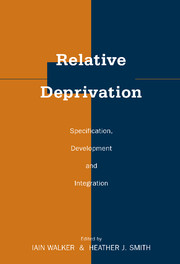Book contents
- Frontmatter
- Contents
- List of Contributors
- 1 Fifty Years of Relative Deprivation Research
- PART ONE SPECIFICATION
- PART TWO DEVELOPMENT
- PART THREE INTEGRATION
- 11 Social Identity and Relative Deprivation
- 12 Relative Deprivation and Counterfactual Thinking
- 13 Relative Deprivation and Attribution: From Grievance to Action
- 14 Spontaneous Temporal and Social Comparisons in Children's Conflict Narratives
- 15 Prejudice as Intergroup Emotion: Integrating Relative Deprivation and Social Comparison Explanations of Prejudice
- Part Four Conclusion
- Index
11 - Social Identity and Relative Deprivation
Published online by Cambridge University Press: 29 September 2009
- Frontmatter
- Contents
- List of Contributors
- 1 Fifty Years of Relative Deprivation Research
- PART ONE SPECIFICATION
- PART TWO DEVELOPMENT
- PART THREE INTEGRATION
- 11 Social Identity and Relative Deprivation
- 12 Relative Deprivation and Counterfactual Thinking
- 13 Relative Deprivation and Attribution: From Grievance to Action
- 14 Spontaneous Temporal and Social Comparisons in Children's Conflict Narratives
- 15 Prejudice as Intergroup Emotion: Integrating Relative Deprivation and Social Comparison Explanations of Prejudice
- Part Four Conclusion
- Index
Summary
PROGRESS IN SOCIAL PSYCHOLOGY: KNOWLEDGE EXTENSION OR ACCUMULATION OF THEORIES?
In his seminal paper of 1967, Pettigrew identified converging insights from different theoretical approaches, to integrate these in his social evaluation theory. What seemed most impressive from the outset was his attempt to “clean house” in social psychological theory, and to combine knowledge from different perspectives to get a handle on important social phenomena. Thirty years later, we are in the position to judge how this has affected further theoretical development in this area: Have research efforts indeed been directed at integrating and combining similar theoretical perspectives, leading to broader insights, as Pettigrew provisioned? Unfortunately, we cannot confirm that this has unequivocally been the case. Even though there is a large body of theoretical and empirical work in social psychology addressing social evaluation processes, the past three decades have witnessed a proliferation of divergent arguments, concepts, and approaches. Accordingly, from time to time, the concern is expressed that contemporary work focuses too much on “single hypothesis” theories, which can only explain narrowly defined phenomena and may therefore undermine development of a common body of knowledge. Nevertheless, partly due to the complexity of the phenomena at hand, researchers have continued to work in this perhaps too fragmented way, and this research policy is reinforced by scientific output ratings in which the productivity of researchers is commonly judged by the number of research papers published in peerreviewed journals, while the writing of an integrative monograph is sometimes not even acknowledged.
- Type
- Chapter
- Information
- Relative DeprivationSpecification, Development, and Integration, pp. 239 - 264Publisher: Cambridge University PressPrint publication year: 2001
- 13
- Cited by



